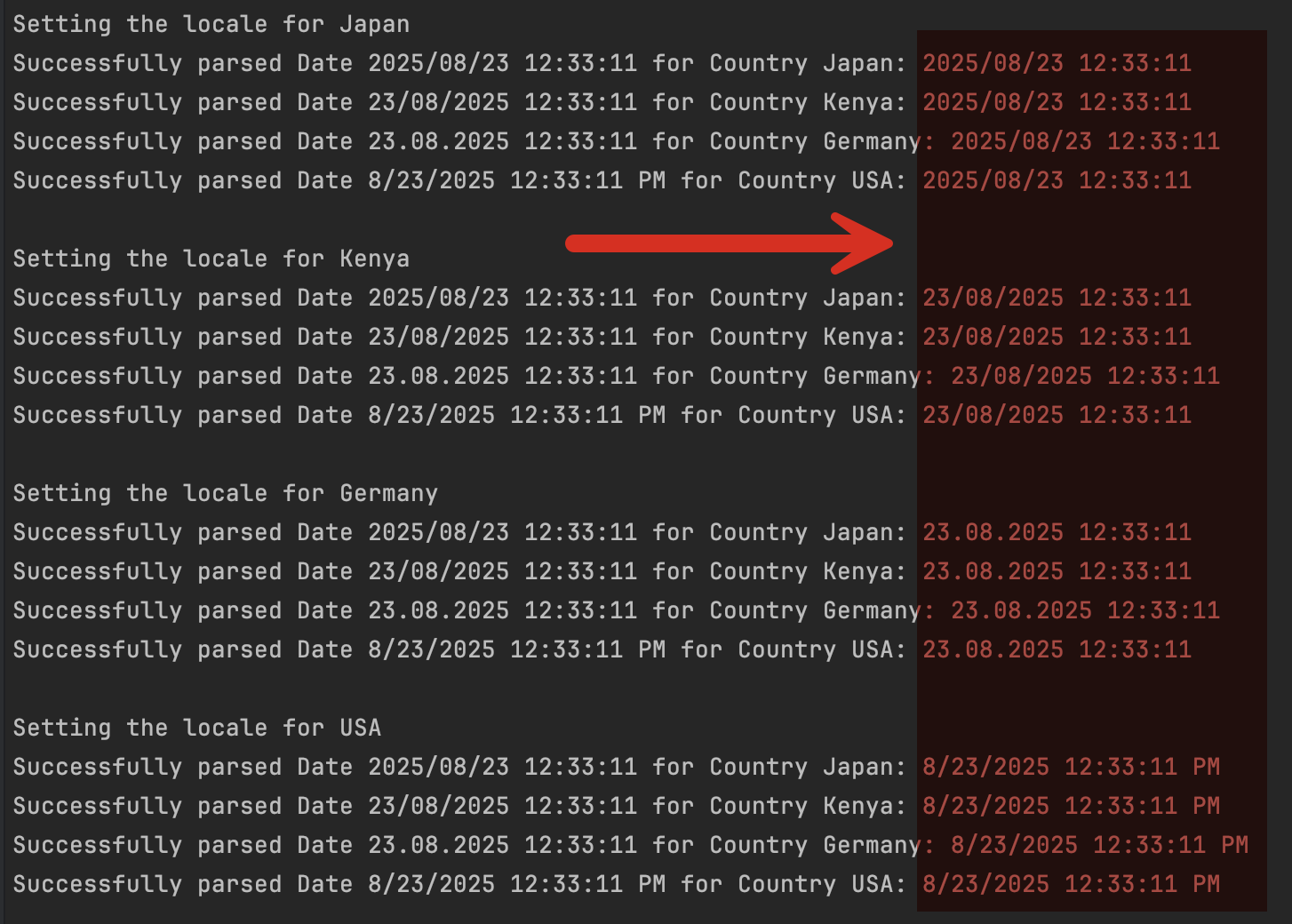Working With Dates In Multiple Locale Formats Simultaneously
[C#, .NET, Internationalization]
In a previous post, Locale Considerations When Parsing Dates, I discussed how locale considerations have a heavy influence on how data gets parsed.
The example I used was as follows:
// Japan
Thread.CurrentThread.CurrentCulture = new CultureInfo("ja-JP");
Console.WriteLine(DateTime.Now);
// Kenya (English)
Thread.CurrentThread.CurrentCulture = new CultureInfo("en-KE");
Console.WriteLine(DateTime.Now);
// German
Thread.CurrentThread.CurrentCulture = new CultureInfo("de-DE");
Console.WriteLine(DateTime.Now);
// USA (English)
Thread.CurrentThread.CurrentCulture = new CultureInfo("en-US");
Console.WriteLine(DateTime.Now);
That printed the following:
2025/06/16 21:32:29
16/06/2025 21:32:29
16.06.2025 21:32:29
6/16/2025 9:32:29 PM
You might have noticed that to change locales at runtime, I actually changed the locale of the running thread.
This may work fine if the aim is for the user’s locale to be detected and used.
It’s not ideal if you need to do the work using dates from different locales at the same time.
To achieve this, we create a CultureInfo object and pass it as an overload to the DateTime.ToString() method.
I can re-write the example to work the same as follows:
// Japan
Console.WriteLine(DateTime.Now.ToString(new CultureInfo("ja-JP")));
// Kenya (English)
Console.WriteLine(DateTime.Now.ToString(new CultureInfo("en-KE")));
// German
Console.WriteLine(DateTime.Now.ToString(new CultureInfo("de-DE")));
// USA (English)
Console.WriteLine(DateTime.Now.ToString(new CultureInfo("en-US")));
This will print the following:
2025/08/23 12:33:11
23/08/2025 12:33:11
23.08.2025 12:33:11
8/23/2025 12:33:11 PM
Similarly, we can achieve the same result when parsing.
Assume that we have the dates and the corresponding country in a database.
| Date | Country |
|---|---|
| 2025/08/23 12:33:11 | Japan |
| 23/08/2025 12:33:11 | Kenya |
| 23.08.2025 12:33:11 | Germany |
| 8/23/2025 12:33:11 PM | USA |
The challenge is to parse all these date strings into the current locale’s date format.
WARNING: Don’t store DateTime as string in the database!
For this, we will build a simple record type to store the information.
internal record DateEntry(string DateTime, string Country);
Then, a helper local function that returns a CultureInfo object given a country Name.
CultureInfo GetCultureInfo(string country)
{
return country switch
{
"Japan" => new CultureInfo("ja-JP"),
"Kenya" => new CultureInfo("en-KE"),
"Germany" => new CultureInfo("de-DE"),
"USA" => new CultureInfo("en-US"),
// Default if unrecognizable
_ => CultureInfo.InvariantCulture
};
}
Finally, the actual code.
using System.Globalization;
var entries = new DateEntry[]
{
new("2025/08/23 12:33:11", "Japan"),
new("23/08/2025 12:33:11", "Kenya"),
new("23.08.2025 12:33:11", "Germany"),
new("8/23/2025 12:33:11 PM", "USA"),
};
foreach (var entry in entries)
{
if (DateTime.TryParse(entry.DateTime, GetCultureInfo(entry.Country), out var date))
{
// Parsing was successful
Console.WriteLine($"Successfully parsed Date {entry.DateTime} for Country {entry.Country}: {date}");
}
else
{
// Parsing failed
Console.WriteLine($"Failed to parse Date {entry.DateTime}");
}
}
This will print the following:
Successfully parsed Date 2025/08/23 12:33:11 for Country Japan: 23/08/2025 12:33:11
Successfully parsed Date 23/08/2025 12:33:11 for Country Kenya: 23/08/2025 12:33:11
Successfully parsed Date 23.08.2025 12:33:11 for Country Germany: 23/08/2025 12:33:11
Successfully parsed Date 8/23/2025 12:33:11 PM for Country USA: 23/08/2025 12:33:11
The awesomeness of this is that, although the dates were stored in completely different formats, we were able to parse them into a DateTime that is understood by the current locale.
We can prove this by rewriting the code to run against 4 different cultures.
var entries = new DateEntry[]
{
new("2025/08/23 12:33:11", "Japan"),
new("23/08/2025 12:33:11", "Kenya"),
new("23.08.2025 12:33:11", "Germany"),
new("8/23/2025 12:33:11 PM", "USA"),
};
foreach (var country in entries)
{
Console.WriteLine($"Setting the locale for {country.Country}");
Thread.CurrentThread.CurrentCulture = GetCultureInfo(country.Country);
foreach (var entry in entries)
{
if (DateTime.TryParse(entry.DateTime, GetCultureInfo(entry.Country), out var date))
{
// Parsing was successful
Console.WriteLine($"Successfully parsed Date {entry.DateTime} for Country {entry.Country}: {date}");
}
else
{
// Parsing failed
Console.WriteLine($"Failed to parse Date {entry.DateTime}");
}
}
Console.WriteLine();
}
This prints the following:

We can see here that the locales are all different (as evidenced by the default output for the dates as highlighted), but the parsing always succeeded.
TLDR
It is possible to work with locale-specific data by using the CultureInfo object for parsing and display.
The code is in my GitHub.
Happy hacking!